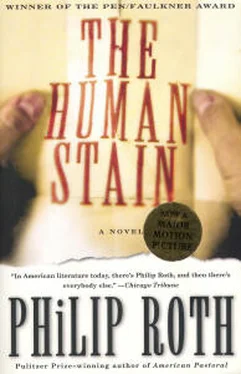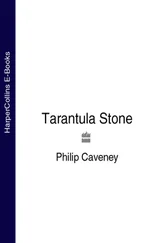Just driving. That's all he's doing. Planning and not planning. Knowing and not knowing. The other headlights are coming at him, and then they're gone. No collision? Okay, no collision. Once they swerve off the road, he changes lanes and keeps going. He just keeps driving. Next morning, waiting with the road crew to go out for the day, he hears about it at the town garage. The other guys already know.
There's no collision so, though he has some sense of it, he's got no details, and when he gets home from driving and gets out of the truck he's not sure what happened. Big day for him. November the eleventh. Veterans Day. That morning he goes with Louie — that morning he goes to the Wall, that afternoon he comes home from the Wall, that night he goes out to kill everybody. Did he? Can't know because there's no collision, but still quite a day from a therapeutic point of view. Second half being more therapeutic than the first. Achieves a true serenity now. Now Kenny can speak to him. Firing side by side with Kenny, both of them opened up on fully automatic, when Hector, the team leader, gives the screaming order “Get your stuff and let's get out of here!” and suddenly Kenny is dead. Quick as that. Up on some hill. Under attack, pulling back — and Kenny's dead. Can't be. His buddy, another farm boy, same background except from Missouri, they were going to do dairy farming together, guy who as a kid of six watched his father die and as a kid of nine watched his mother die, raised after that by an uncle he loved and was always talking about, a successful dairy farmer with a good-sized spread — 180 milking cows, twelve machines milking six cows a side in the parlor at a time — and Kenny's head is gone and he's dead.
Looks like Les is communicating with his buddy now. Showed Kenny that Kenny's not forgotten. Kenny wanted him to do it, and he did it. Now he knows that whatever he did — even if he's not sure what it was — he did it for Kenny. Even if he did kill someone and he goes to jail, it doesn't matter — it can't matter because he's dead. This was just one last thing to do for Kenny. Squared it with him. Knows everything is now all right with Kenny.
(“I went to the Wall and there was his name and it was silence. Waited and waited and waited. I looked at him, he looked at me. I didn't hear anything, didn't feel anything, and that's the point I knew it wasn't okay with Kenny. That there was more to be done. Didn't know what it was. But he wouldn't have just left me like that. That's why there was no message for me. Because I still had more to do for Kenny. Now? Now it's okay with Kenny. Now he can rest.” “And are you still dead?” “What are you, an asswipe? Oh, I can't talk to you, you asswipe! I did it because I am dead!”)
Next morning, first thing, he hears at the garage that she was with the Jew in a car crash. Everybody figures that she was blowing him and he lost control and they went off the road and through the barrier and over the embankment and front-end-first into the shallows of the river. The Jew lost control of the car.
No, he does not associate this with what happened the night before. He was just out driving, in a different state of mind entirely.
He says, “Yeah? What happened? Who killed her?”
“The Jew killed her. Went off the road.”
“She was probably going down on him.”
“That's what they say.”
That's it. Doesn't feel anything about that either. Still feels nothing. Except his suffering. Why is he suffering so much for what happened to him when she can go on giving blow jobs to old Jews? He's the one who does the suffering, and now she just up and walks away from it all.
Anyway, as he sips his morning coffee at the town garage, looks that way to him.
When everybody gets up to start for the trucks, Les says, “Guess that music won't be coming from that house on Saturday nights anymore.”
Though, as sometimes happens, nobody knows what he's talking about, they laugh anyway, and with that, the workday begins.
If she located herself in western Massachusetts, the ad could be traced back to her by colleagues who subscribed to the New York Review of Books, particularly if she went on to describe her appearance and list her credentials. Yet if she didn't specify her place of residence, she could wind up with not a single response from anyone within a radius of a hundred, two, even three hundred miles. And since in every ad she'd studied in the New York Review, the age given by women exceeded her own by from fifteen to thirty years, how could she go ahead to reveal her correct age — to portray herself correctly altogether — without arousing the suspicion that there was something significant undisclosed by her and wrong with her, a woman claiming to be so young, so attractive, so accomplished who found it necessary to look for a man through a personal ad? If she described herself as “passionate,” this might readily be interpreted by the lascivious-minded to be an intentional provocation, to mean “loose” or worse, and letters would come pouring in to her NYRB box from the men she wanted nothing to do with. But if she appeared to be a bluestocking for whom sex was of decidedly less importance than her academic, scholarly, and intellectual pursuits, she would be sure to encourage a response from a type who would be all too maidenly for someone as excitable as she could be with an erotic counterpart she could trust. If she presented herself as “pretty,” she would be associating herself with a vague catchall category of women, and yet if she described herself, straight out, as “beautiful,” if she dared to be truthful enough to evoke the word that had never seemed extravagant to her lovers — who had called her éblouissante (as in “ Éblouissante! Tu as un visage de chat”); dazzling, stunning — or if, for the sake of precision in a text of only thirty or so words, she invoked the resemblance noted by her elders to Leslie Caron who her father always enjoyed making too much of, then anyone other than a megalomaniac might be too intimidated to approach her or refuse to take her seriously as an intellectual. If she wrote, “A photo accompanying the letter would be welcome,” or, simply, “Photo, please,” it could be misunderstood to imply that she esteemed good looks above intelligence, erudition, and cultural refinement; moreover, any photos she received might be touched up, years old, or altogether spurious. Asking for a photo might even discourage a response from the very men whose interest she was hoping to elicit. Yet if she didn't request a photo, she could wind up traveling all the way to Boston, to New York, or farther, to find herself the dinner companion of someone wholly inappropriate and even distasteful. And distasteful not necessarily because of looks alone. What if he was a liar? What if he was a charlatan? What if he was a psychopath? What if he had AIDS? What if he was violent, vicious, married, or on Medicare? What if he was a weirdo, someone she couldn't get rid of? What if she gave her name and her place of employment to a stalker? Yet, on their first meeting, how could she withhold her name? In search of a serious, impassioned love affair leading to marriage and a family, how could an open, honest person start off by lying about something as fundamental as her name? And what about race? Oughtn't she to include the kindly solicitation “Race unimportant”? But it wasn't unimportant; it should be, it ought to be, it well might have been but for the fiasco back in Paris when she was seventeen that convinced her that a man of another race was an unfeasible — because an unknowable — partner.
She was young and adventurous, she didn't want to be cautious, and he was from a good family in Brazzaville, the son of a supreme court judge — or so he said — in Paris as an exchange student for a year at Nanterre. Dominique was his name, and she thought of him as a fellow spiritual lover of literature. She'd met him at one of the Milan Kundera lectures. He picked her up there, and outside they were still basking in Kundera's observations on Madame Bovary, infected, the both of them, with what Delphine excitedly thought of as “the Kundera disease.” Kundera was legitimatized for them by being persecuted as a Czech writer, by being someone who had lost out in Czechoslovakia's great historical struggle to be free. Kundera's playfulness did not appear to be frivolous, not at all. The Book of Laughter and Forgetting they loved. There was something trustworthy about him. His Eastern Europeanness. The restless nature of the intellectual. That everything appeared to be difficult for him. Both were won over by Kundera's modesty, the very opposite of superstar demeanor, and both believed in his ethos of thinking and suffering. All that intellectual tribulation — and then there were his looks. Delphine was very taken by the writer's poetically prize-fighterish looks, to her an outward sign of everything colliding within.
Читать дальше












